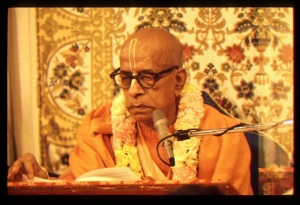CC Antya 1.150 (1975)

A.C. Bhaktivedanta Swami Prabhupada
TEXT 150
- stotraṁ yatra taṭa-sthatāṁ prakaṭayac cittasya dhatte vyathāṁ
- nindāpi pramadaṁ prayacchati parīhāsa-śriyaṁ bibhratī
- doṣeṇa kṣayitām guṇena gurutāṁ kenāpy anātanvatī
- premṇaḥ svārasikasya kasyacid iyaṁ vikrīḍati prakriyā
SYNONYMS
stotram—praising; yatra—in which; taṭa-sthatām—neutrality; prakaṭayat—manifesting; cittasya—to the heart; dhatte—gives; vyathām—painful reaction; nindā—blaspheming; api—also; pramadam—pleasure; prayacchati—delivers; parīhāsa—of joking; śriyam—the beauty; bibhratī—bringing forth; doṣeṇa—by accusation; kṣayitām—the quality of diminishing; guṇena—by good qualities; gurutām—the importance; kena api—by any; anātanvatī—not increasing; premṇaḥ—of love of Godhead; svārasikasya—spontaneous; kasyacit—of any; iyam—this; vikrīḍati—acts within the heart; prakriyā—the manner of action.
TRANSLATION
'When one hears praise from his beloved, he outwardIy remains neutral but feels pain within his heart. When he hears his beloved making accusations about him, he takes them to be jokes and enjoys pleasure. When he finds faults in his beloved, they do not diminish his love, nor do the beloved's good qualities increase his spontaneous affection. Thus spontaneous love continues under all circumstances. That is how spontaneous love of Godhead acts within the heart.'
PURPORT
This verse from Vidagdha-mādhava (5.4) is spoken by Paurṇamāsī, the grandmother of Rādhārāṇī and mother of Sāndīpani Muni.